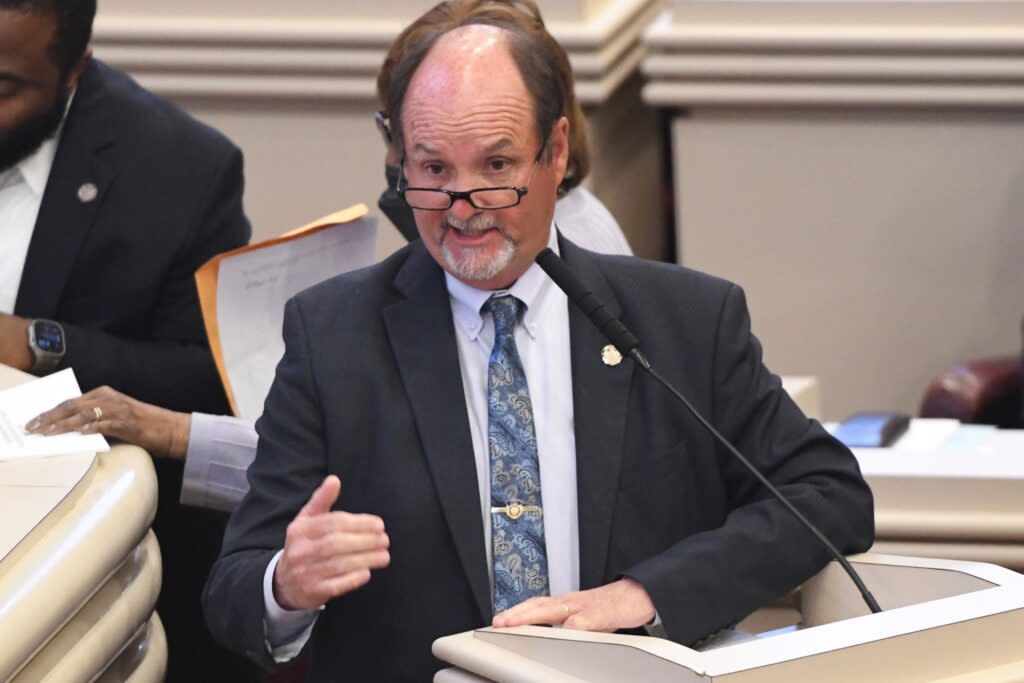Alabama House approves bill capping property tax increases

- Oops!Something went wrong.Please try again later.
Rep. Phillip Pettus, R-Killen, discusses a bill to cap property tax increases on the floor of the Alabama House of Representatives on April 9, 2024 at the Alabama Statehouse in Montgomery, Alabama. (Brian Lyman/Alabama Reflector)
The Alabama House of Representatives Tuesday approved a bill that caps increases in the assessed value of properties.
HB 73, sponsored by Rep. Philip Pettus, R-Killen, passed the chamber on a 97-1 vote. The measure limits increases in assessed values on residential and commercial property to 7% of the assessed value of the property from the previous year.
“Under existing law, there is no limit on increase in assessed values of real property. This bill will provide for a cap on real property tax assessment under certain conditions,” Pettus said in introducing the bill.
GET THE MORNING HEADLINES DELIVERED TO YOUR INBOX
The cap was originally set at 3% for residential properties and 5% for commercial properties, but an amendment offered by Pettus changed both caps to 7%. Pettus said on the floor that the 7% cap was negotiated with the Association of County Commissions of Alabama, the Alabama League of Municipalities and “several groups.”
The cap would not apply to property that have been renovated; if there’s been new construction, not including standard repairs, or if there’s been a change in ownership, unless it was between family.
Pettus’ amendment will repeal the cap on Oct. 1, 2029 and require the Alabama Department of Revenue and the Alabama Ad Valorem Advisory Committee to submit findings and recommendations regarding the impact of the cap on the property values to the governor, the lieutenant governor, the president pro tempore of the Senate, the speaker of the House of Representatives, and to the Legislative Services Agency by Dec. 31, 2026.
Rep. Jim Hill, R-Odenville, said he supported sunsetting the legislation. Capping the tax at 7% instead of 3% was a “good idea,” he said.
With that, Hill asked the sponsor if he knew that property taxes that have been raised can be contested. The sponsor said he did. Hill then asked if the resolution is not favorable, the decision could be appealed in circuit court. The sponsor agreed.
“So, they-can-do-it-as-they-will-without-any-constraints is really not accurate. There are constraints on what they do,” Hill said.
Hill said that he supports capping taxes that go into the General Fund, but since a significant portion of property taxes go to counties, cities and schools, he introduced an amendment that would apply the cap only to revenue going to the state.
The amendment was tabled on a 69-17 vote.
Hill then offered a second amendment that would allow a county commission to put the cap in effect if the county has a population growth of at least 1.5%.
“Whether or not this goes into effect, to diminish the amount of monies that come to your county, that are capped in this way, is up to the county commission,” Hill said.
The amendment failed on a 79-15 vote.
Alabama State Schools Superintendent Eric Mackey said in a phone interview he was happy the bill was amended to a 7% cap, and he felt that compromise is fairer to school districts across the state. While fast growing areas like Auburn, Huntsville and Baldwin County could be more impacted, Mackey said the 7% cap would still meet the needs of most schools districts.
“I think 7% was the right place to land for local government. It’s the right place for the state,” he said.
Rep. Brett Easterbrook, R-Fruitdale, spoke in support of the bill, saying that fast-growing areas in his district had been impacted by steep property tax increases.
“You have families that have property, that have been in that family for generations, and now they can’t afford to live there because of property taxes and insurance,” Easterbrook said. “They’re having to move. There’s nothing right about that.”
Easterbrook spoke against property taxes in general, saying he would support eliminating the property tax altogether, calling it “the most unfair tax out there.”
“The only reason we have property taxes, that was the only way they could collect taxes in the horse and buggy days, because they couldn’t find people. If you didn’t pay your property tax, they sold the land,” he said.
The bill moves to the Senate.
The post Alabama House approves bill capping property tax increases appeared first on Alabama Reflector.

